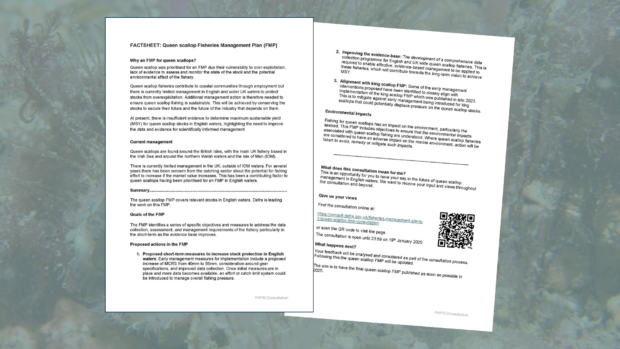https://defrafmp.blog.gov.uk/factsheet-queen-scallop-fisheries-management-plan-fmp/
FACTSHEET: Queen scallop Fisheries Management Plan (FMP)
Why an FMP for queen scallops?
Queen scallop was prioritised for an FMP due their vulnerability to over-exploitation, lack of evidence to assess and monitor the state of the stock and the potential environmental effect of the fishery.
Queen scallop fisheries contribute to coastal communities through employment but there is currently limited management in English and wider UK waters to protect stocks from overexploitation. Additional management action is therefore needed to ensure queen scallop fishing is sustainable. This will be achieved by conserving the stocks to secure their future and the future of the industry that depends on them.
At present, there is insufficient evidence to determine maximum sustainable yield (MSY) for queen scallop stocks in English waters, highlighting the need to improve the data and evidence for scientifically informed management.
Current management
Queen scallops are found around the British Isles, with the main UK fishery based in the Irish Sea and around the northern Welsh waters and the Isle of Man (IOM).
There is currently limited management in the UK, outside of IOM waters. For several years there has been concern from the catching sector about the potential for fishing effort to increase if the market value increases. This has been a contributing factor to queen scallops having been prioritised for an FMP in English waters.
Summary
The queen scallop FMP covers relevant stocks in English waters. Defra is leading the work on this FMP.
Goals of the FMP
The FMP identifies a series of specific objectives and measures to address the data collection, assessment, and management requirements of the fishery particularly in the short-term as the evidence base improves.
Proposed actions in the FMP
- Proposed short-term measures to increase stock protection in English waters: Early management measures for implementation include a proposed increase of MCRS from 40mm to 55mm, consideration around gear specifications, and improved data collection. Once initial measures are in place and more data becomes available, an effort or catch limit system could be introduced to manage overall fishing pressure.
- Improving the evidence-base: The development of a comprehensive data collection programme for English and UK wide queen scallop fisheries. This is required to enable effective, evidence-based management to be applied to these fisheries, which will contribute towards the long-term vision to achieve MSY.
- Alignment with king scallop FMP: Some of the early management interventions proposed have been identified to closely align with implementation of the king scallop FMP which was published in late 2023. This is to mitigate against early management being introduced for king scallops that could potentially displace pressure on the queen scallop stocks.
Environmental impacts
Fishing for queen scallops has an impact on the environment, particularly the seabed. This FMP includes objectives to ensure that the environmental impacts associated with queen scallop fishing are understood. Where queen scallop fisheries are considered to have an adverse impact on the marine environment, action will be taken to avoid, remedy or mitigate such impacts.
What does this consultation mean for me?
This is an opportunity for you to have your say in the future of queen scallop management in English waters. We want to receive your input and views throughout the consultation and beyond.
Give us your views
Find the consultation online at: https://consult.defra.gov.uk/fisheries-management-plans-1/queen-scallop-fmp-consultation
The consultation is open until 23:59 on 19 January 2025.
What happens next?
Your feedback will be analysed and considered as part of the consultation process. Following this the queen scallop FMP will be updated.
The aim is to have the final queen scallop FMP published as soon as possible in 2025.
For a printable version of this factsheet please contact FMPs@defra.gov.uk
